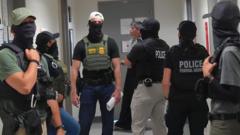Why Did California Ban Law Enforcement, Including ICE, from Wearing Masks?

Published: 2025-09-21 13:55:22 | Category: technology
California has enacted a new law banning local and federal law enforcement officers, including those from US Immigration and Customs Enforcement (ICE), from wearing face masks while on duty. This decision, set to take effect on 1 January 2026, aims to enhance transparency and protect residents from what Governor Gavin Newsom describes as "secret police." The law is part of a broader legislative effort to safeguard immigrant rights in the state.
Last updated: 05 October 2023 (BST)
Key Takeaways
- The ban on masks for law enforcement is aimed at increasing transparency and accountability.
- Exceptions to the ban include undercover agents and those using masks for health or tactical reasons.
- The legislation responds to concerns over immigration enforcement tactics in California.
- Governor Newsom has signed additional bills to protect immigrant rights in schools and hospitals.
- Federal officials have criticised the law, claiming it jeopardises officer safety.
The Context Behind the Ban
The new law arises from a growing tension between state authorities in California and the federal government regarding immigration enforcement. Governor Newsom's administration has positioned itself as a defender of immigrant rights amidst increasing federal immigration raids and enforcement under the Trump administration.
In recent years, many California residents have expressed concern over the tactics employed by federal agents, particularly during immigration raids that have occurred in public spaces, including schools and hospitals. The use of masks by law enforcement during such operations has raised questions about accountability and transparency. By prohibiting masks, California aims to ensure that officers are identifiable and, consequently, accountable for their actions while on duty.
Details of the Legislation
The legislation includes several key provisions aimed at enhancing transparency in law enforcement practices:
- Officers must not wear face masks while on duty, with specific exceptions for undercover operations and protective gear.
- Law enforcement officials are required to identify themselves by name and badge number when conducting their duties.
- Federal agents are prohibited from entering school sites without a judicial warrant, court order, or judicial subpoena.
- Families must be notified when officers arrive at schools to conduct immigration enforcement activities.
- Non-public areas of hospitals and emergency rooms are off-limits to law enforcement without proper legal documentation.
Political Reactions
The response to the new law has been mixed. Supporters argue that it is a necessary step towards protecting immigrant communities from aggressive enforcement tactics. Senator Scott Wiener, who authored the bill, stated, "No one wants masked officers roaming their communities and kidnapping people with impunity." This sentiment echoes a broader desire in California to uphold civil liberties and protect vulnerable populations.
Conversely, federal officials have condemned the legislation as dangerous and detrimental to officer safety. U.S. Attorney Bill Essayli, a Trump appointee, asserted that California lacks jurisdiction over federal operations and that the law would not hinder ICE's enforcement capabilities. He emphasised that federal agents will continue to protect their identities, regardless of state laws.
Impact on Immigration Enforcement
This law comes at a time when immigration enforcement policies are under scrutiny. The Supreme Court recently ruled that immigration stops in Los Angeles could proceed without reasonable suspicion, allowing officers to detain individuals based on race or language. This ruling has sparked concerns about racial profiling and the potential for abuse of power by law enforcement.
The California legislation also aligns with ongoing efforts to resist federal immigration policies perceived as hostile towards immigrant communities. The state's lawmakers are determined to create legal barriers that protect residents against aggressive enforcement actions, especially in sensitive environments like schools and healthcare facilities.
What Happens Next?
As the implementation date of the mask ban approaches, it will be crucial to monitor its impact on law enforcement practices and community relations. California's stance may inspire similar legislative efforts in other states, particularly those with large immigrant populations. However, the federal response remains uncertain, and it is likely that legal challenges could arise that question the validity of California's authority to impose such restrictions on federal agents.
Furthermore, as tensions between state and federal authorities escalate, the ongoing dialogue surrounding immigration enforcement will continue to evolve. Advocates for immigrant rights are encouraged by California's legislative actions, while opponents argue that such measures may compromise public safety and the effectiveness of law enforcement.
Conclusion
California's decision to ban masks for law enforcement officers while on duty represents a significant shift in the state's approach to immigration and law enforcement. With the law set to take effect in January 2026, it signals a commitment to transparency and accountability in policing practices, particularly regarding immigration enforcement. As this legislation unfolds, it raises important questions about the balance between public safety and the protection of civil liberties in an increasingly polarised political landscape.
FAQs
What is the main purpose of California's mask ban for law enforcement?
The primary purpose is to enhance transparency and accountability among law enforcement officers, particularly during immigration enforcement activities, by ensuring they are identifiable while on duty.
Are there any exceptions to the mask ban?
Yes, exceptions include undercover agents, as well as masks used for health protection or during tactical operations.
When will the law take effect?
The law is set to take effect on 1 January 2026.
What other laws have been passed alongside the mask ban?
Additional laws require law enforcement to identify themselves while conducting their duties and restrict federal agents from entering schools or hospitals without proper legal documents.
How has the federal government reacted to the ban?
Federal officials have condemned the law, stating it undermines officer safety and asserting that California lacks jurisdiction over federal operations.
#CaliforniaLaw #ImmigrationPolicy #LawEnforcement



